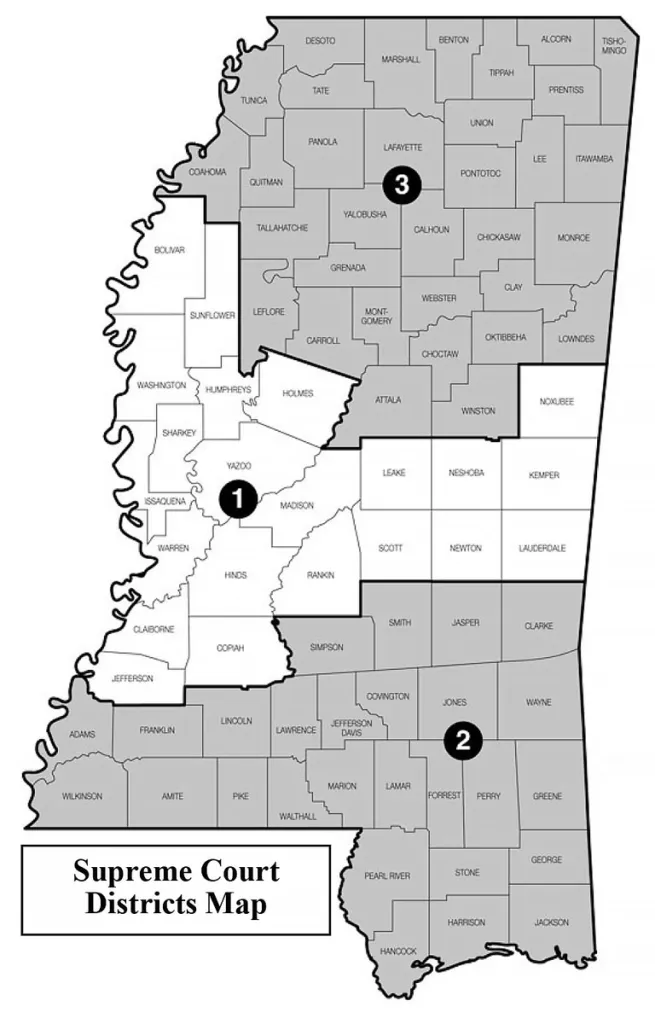August 20, 2025 Story by: Publisher
A federal judge has ruled that Mississippi’s current Supreme Court electoral map unlawfully dilutes the voting power of Black citizens, violating the Voting Rights Act of 1965.
U.S. District Judge Sharion Aycock issued the decision on Tuesday August 19, ordering the state to redraw its election map.
The existing map, in place since 1987, divides the state into three districts for nonpartisan, staggered elections of nine justices. Despite Black residents comprising approximately 40% of Mississippi’s population, only four Black justices have ever served on the court, all appointed to the same seat in District 1, which includes Jackson and parts of the Mississippi Delta. None of these justices were elected.
Judge Aycock emphasized that the map’s design, which splits the majority-Black Delta region, hinders Black voters’ ability to elect candidates of their choice. The ruling aligns with a lawsuit filed by the ACLU and other advocacy groups, highlighting the state’s history of voting suppression.
District 1 already represented an election district in which Black people make up a majority of the voting age population, at 51.1%.

Photo caption: The Mississippi Supreme Court district map cuts the Mississippi Delta, a historically Black area, in half.( Map courtesy Mississippi Courts)
But Aycock, who presided over a non-jury trial in the case, said that data did not reflect voter eligibility or account for the state’s lifetime ban on voting for people convicted of certain felonies, which disproportionately affects Black people.
Aycock pointed to a history of the southern state suppressing Black voters over nearly a century leading up to the Voting Rights Act’s passage, after they gained the right to vote in the state in 1868 following the end of the Civil War.
“The evidence reveals a history of voting-related discrimination in Mississippi and the utilization of voting practices and procedures that continue to enhance the opportunity to discriminate against or suppress the votes of Black Mississippians,” Aycock wrote.
The judge, an appointee of Republican President George W. Bush, blocked future use of the current map and directed the Mississippi legislature to draw up a new one. She said she would hold a hearing to address what deadline should be set.
The Mississippi Attorney General’s office is reviewing the decision. A future hearing will determine a deadline for the legislature to submit a new electoral map.
This ruling adds to a series of recent legal challenges in Mississippi concerning electoral maps and Black voter representation. In April, a federal panel approved a revised legislative redistricting plan to ensure fair representation for Black voters in DeSoto County.
The only Black justice currently is Presiding Justice Leslie King.
The Mississippi Legislature will be tasked with implementing the court’s order by drawing new district lines.
Earlier this year, when lawmakers gaveled in on Jan. 7, they had to come up with, lobby for and pass a revised state legislative redistricted map. The proposal later gained approval from a panel of three federal judges, requiring the state to host 15 special elections for legislative seats this November.
Background
White v. State Board of Election Commissioners in the United States District Court for the Northern District of Mississippi:
The case addresses the plaintiffs’ motion for judicial notice concerning the results of the November 2024 Mississippi Supreme Court elections.
The lawsuit, White v. State Board of Election Commissioners, was filed in April 2022, by the ACLU and other advocacy groups. The plaintiffs in this case—Dyamone White, Derrick Simmons, Ty Pinkins, and Constance Olivia Slaughter Harvey-Burwell—challenged the constitutionality of Mississippi’s Supreme Court electoral map, arguing that it diluted the voting power of Black citizens in violation of the Voting Rights Act of 1965.
Despite Black residents comprising approximately 40% of Mississippi’s population, only four Black justices have ever served on the court, all appointed to the same seat in District 1, which includes Jackson and parts of the Mississippi Delta.
The document you’ve provided is a legal filing from the case White v. State Board of Election Commissioners, dated January 30, 2025. This filing is a reply memorandum in support of the plaintiffs’ motion for judicial notice, submitted in the United States District Court for the Northern District of Mississippi, Greenville Division.
In the memorandum, the plaintiffs were seeking judicial notice of the results of the November 2024 Mississippi Supreme Court elections, in which a Black-preferred incumbent candidate lost in District 1. They argue that this outcome strongly corroborates their claim that Black-preferred candidates are usually defeated under the challenged district lines, thus confirming that political opportunity is not equally available to Black voters.
The defendants, including the State Board of Election Commissioners and state officials, do not dispute that the court may judicially notice the election results.
The plaintiffs contend that the 2024 election results provide empirical evidence supporting their claim of vote dilution and underrepresentation of Black voters.

















